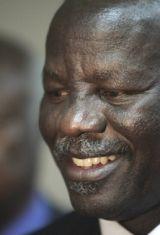Sudan is ready for Darfur peace talks – FM
June 18, 2007 (KHARTOUM) — Sudan is ready to attend Darfur peace talks under joint U.N.-African Union mediation to resolve a conflict which has driven 2.5 million people from their homes, the country’s foreign minister said on Monday.

Rebels in Darfur have split into more than a dozen groups since a peace deal last year signed by only one of three rebel negotiating factions. Many leaders have lost control of their commanders on the ground, creating a chaotic and dangerous environment for aid workers and peacekeepers.
“Any time they want the peace talks to start we have always been ready,” Akol told reporters. “The problem is with the other side.”
The AU-U.N. initiative hopes to have all factions lined up to begin talks around August. The former U.N. humanitarian chief in Sudan Manuel Aranda da Silva has said the rebels do not have to unite, but should have a unified position before talks.
Aid workers involved in the world’s largest humanitarian operation say an agreement is a priority to create an effective ceasefire. Some have worried about slow progress to bring all factions to the table.
U.N. Security Council ambassadors, who held talks in Sudan on Sunday, on Monday warmly welcomed Khartoum’s acceptance of the so-called “hybrid” AU-U.N. force for Darfur, including the details of its command and control structure.
“This will minimise violence throughout Sudan so we are very happy about that,” South Africa’s ambassador Dumisani Kumalo told reporters in Accra after the delegation held talks with Ghanaian President John Kufuor, the current AU chairman.
But the U.N. envoys warned Sudan’s government not to backslide on the agreement.
“We have heard the words, we need the deeds, and I address that too to the rebels,” said British envoy Emyr Jones Parry.
European foreign ministers also hailed the agreement on the joint Darfur mission, but warned that sanctions could be imposed on any individual hindering the peace process.
“The (EU) will consider any party failing to constructively engage in this process as an obstacle to peace and will promote appropriate further measures against them, notably in the UN framework,” they said in a statement.
AFRICAN FORCE COMMANDER
One aid official in Sudan, who declined to be named, said international peace mediators for Darfur should be based in Khartoum to be most effective, not just jetting in and out.
U.N. special envoy Jan Eliasson, a Swede, appointed Finn Pekka Haavisto to assist him. But Haavisto, like Eliasson, has decided to be based outside Sudan.
International experts estimate 200,000 have died in more than four years of conflict in Darfur, violence Washington calls genocide. Khartoum rejects the term and puts the toll at 9,000.
The conflict flared when mostly non-Arab rebels took up arms in early 2003 accusing central government of neglecting the remote, arid Western region. Khartoum mobilised militias to quell the revolt.
Car-jackings, abductions and ambushes are hindering efforts by aid workers, a U.N. report obtained by Reuters said.
A record 68 aid vehicles were ambushed in the first five months of 2007 and 23 of those attacks involved abductions, the U.N. security report said.
Sudanese Foreign Minister Akol said all sides were in agreement over the command and control system for the AU-U.N. force. “The commander is African,” Akol said. “The (command and control) structures that are followed by the U.N. are the ones that we have agreed would be adopted by the African Union.”
“So we say the command and control structures are the UN,” he added.
Diplomats said China, India and Pakistan had indicated interest in contributing to the force. Akol said those nations were friends of Sudan, but that the final decision would be up to the United Nations and AU.
(Reuters)
